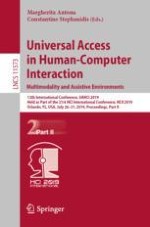2019 | OriginalPaper | Buchkapitel
EEG Systems for Educational Neuroscience
verfasst von : Angeliki Tsiara, Tassos Anastasios Mikropoulos, Panagiota Chalki
Erschienen in: Universal Access in Human-Computer Interaction. Multimodality and Assistive Environments
Aktivieren Sie unsere intelligente Suche, um passende Fachinhalte oder Patente zu finden.
Wählen Sie Textabschnitte aus um mit Künstlicher Intelligenz passenden Patente zu finden. powered by
Markieren Sie Textabschnitte, um KI-gestützt weitere passende Inhalte zu finden. powered by
